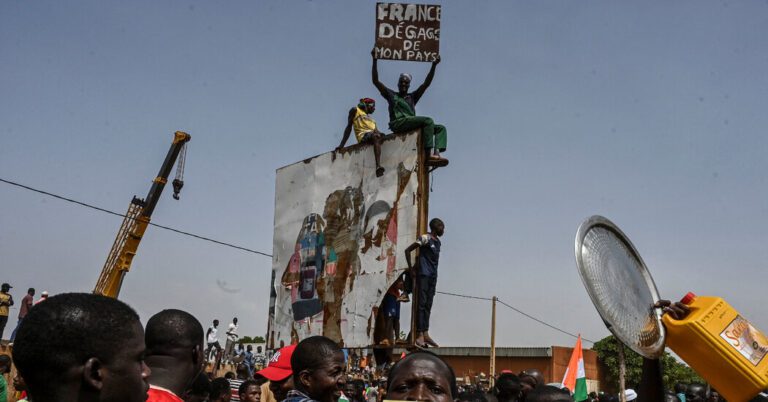
[ad_1]
France will withdraw nearly 1,500 troops from the West African nation of Niger by the end of the year, President Emmanuel Macron said on Sunday, a decision that could upend the West’s security footprint in the region, including the future of 1,100 American troops based in Niger.
In an interview on French television, Mr. Macron also said that the country’s ambassador to Niger would leave “within the next hours.” He added, “And we are ending our military cooperation with the de facto authorities in Niger, because they no longer want to fight terrorism.”
The short announcement comes after weeks of escalating tensions between France and the new military leaders in Niger, who seized power in a coup in July. It also caps years of waning influence for France, a former colonizer in West Africa whose economic presence and military clout in the region remains considerable despite being increasingly challenged by juntas and foreign powers like Russia.
Mr. Macron had refused to heed calls by Niger’s new leaders to recall troops and his ambassador, a position that most analysts and even French and European diplomats based in West Africa said had become untenable.
“We’re not here to take part in political affairs, to be hostages, in a way, of the putschists,” Mr. Macron said in an interview with the TF1 and France 2 television channels. He added that France would coordinate with the authorities in Niger to ensure French troops depart in an “orderly manner” over the coming months.
Niger’s military leaders had not responded as of Sunday night.
For weeks, tens of thousands of protesters in Niger’s capital, Niamey, have regularly demonstrated in front of the base hosting French military forces. At a recent protest attended by a New York Times reporter, demonstrators trampled on a French flag, carried a coffin they said was meant for Mr. Macron and brandished signs reading, “Death to France.”
After the coup that ousted the civilian president, Mohamed Bazoum, Western countries suspended their aid and security partnerships with Niger, one of the world’s poorest countries, whose leader was seen as one of the last reliable allies in a region now dominated by men in uniform.
As Western countries have recalled troops training Nigerien soldiers in recent weeks, the future of Western involvement in the Sahel region — the world’s epicenter of jihadist activity — remains uncertain.
Niger is a key transit country in the migration route to Europe, and in recent years the European Union has poured hundreds of millions of dollars into buffering its northern areas with transit centers and repatriation flights.
This month, the United States announced that it was moving its troops from the base in Niamey, where the French soldiers are also positioned, to an outpost in Agadez, in the north, where it operates drones monitoring insurgents’ activities in the region.
On Sunday, Mr. Macron defended France’s track record in the region, arguing that it had intervened militarily only at the request of countries like Mali, Burkina Faso and Niger, and that those countries would have fallen prey to terrorist groups without French troops.
“The putschists are the friends of disorder,” Mr. Macron said, pointing to a recent uptick in violence perpetrated by Islamist terrorist groups in countries where French troops were forced out, like Mali.
The president said France would continue to help African countries fight against terrorism. “But we only do it if it is at the request of democratically elected authorities and regional authorities,” Mr. Macron said.
He added, “We are not here to take part in coups or to interfere.”
[ad_2]